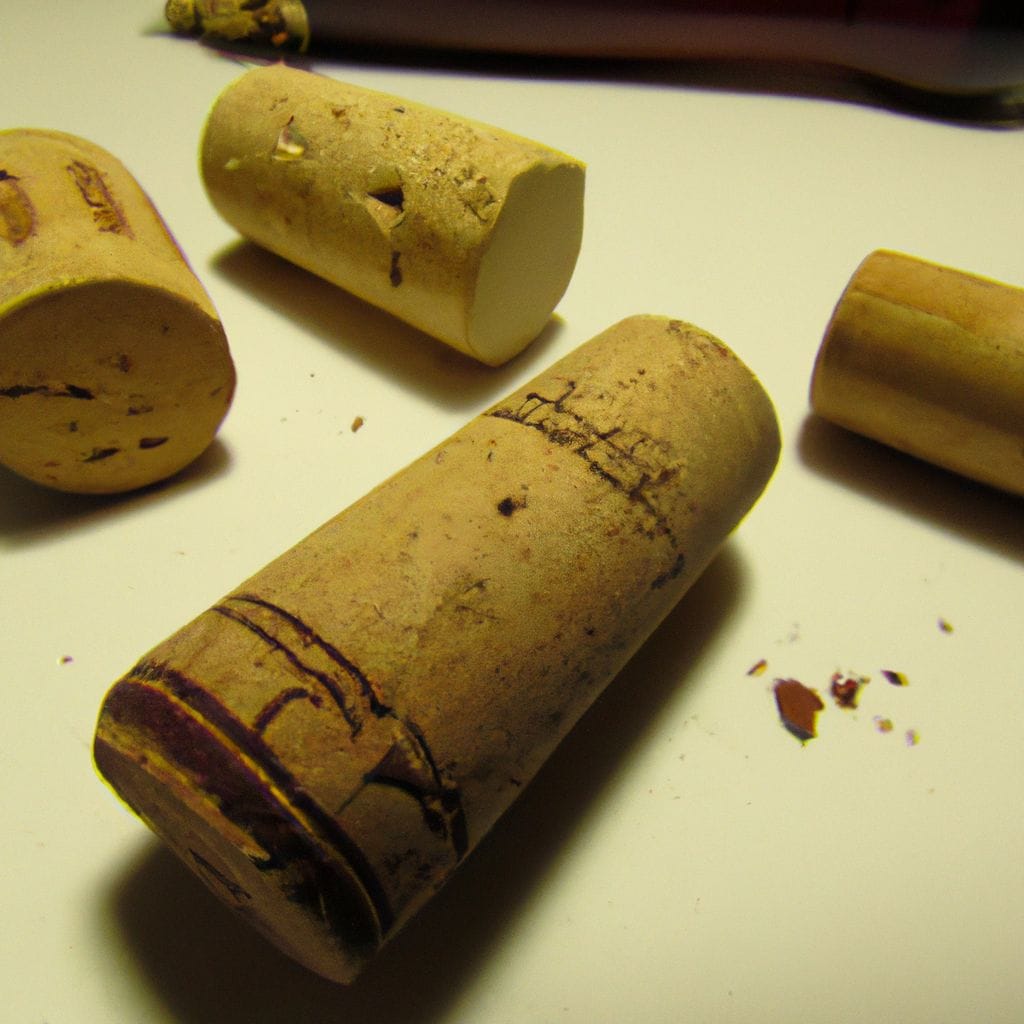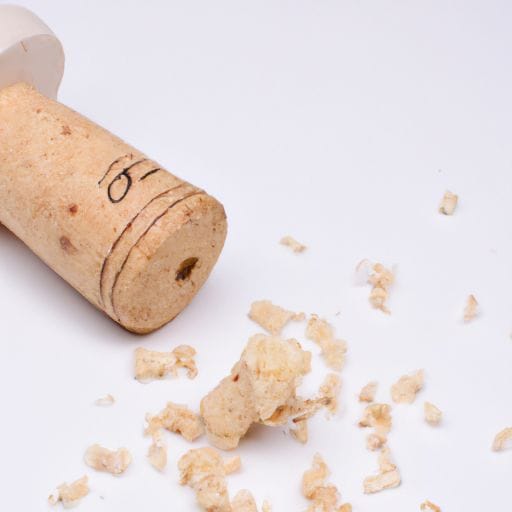Corked wine is a type of wine that has been contaminated with a chemical compound called TCA (2,4,6-trichloroanisole). This chemical compound is found in the cork of the bottle and can give the wine a musty, moldy, or damp smell and taste. Corked wine can be unpleasant to drink and can ruin the experience of enjoying a good bottle of wine. In this article, we will discuss what corked wine tastes like and how to identify it. We will also discuss how to avoid buying corked wine and what to do if you find yourself with a bottle of corked wine.
Exploring the Different Types of Corked Wine and What They Taste Like
Contents
- 1 Exploring the Different Types of Corked Wine and What They Taste Like
- 2 How to Identify a Corked Wine and What to Expect in Taste
- 3 The Science Behind Corked Wine and How It Affects Taste
- 4 The Pros and Cons of Corked Wine and How It Affects Taste
- 5 How to Tell if a Wine is Corked and What to Expect in Taste
- 6 The Different Aromas of Corked Wine and How They Affect Taste
- 7 The History of Corked Wine and How It Affects Taste
- 8 The Best Ways to Store Corked Wine and How It Affects Taste
- 9 Conclusion
Corked wine is a type of wine that has been sealed with a cork, rather than a screw cap or synthetic stopper. This type of wine has been around for centuries and is still popular today. There are many different types of corked wine, each with its own unique flavor and aroma. Let’s explore the different types of corked wine and what they taste like.
Red Wine: Red wine is one of the most popular types of corked wine. It is made from dark-colored grapes and has a deep, rich flavor. Red wines are typically full-bodied and have notes of dark fruit, such as blackberry and plum, as well as hints of spice and oak.
White Wine: White wine is made from light-colored grapes and has a lighter flavor than red wine. It is usually crisp and refreshing, with notes of citrus, apple, and pear. White wines are often described as having a floral aroma.
Sparkling Wine: Sparkling wine is a type of corked wine that has been carbonated. It is usually light and bubbly, with notes of citrus and green apple. Sparkling wines are often served as an aperitif or as a celebratory drink.
Rosé Wine: Rosé wine is a type of corked wine that is made from a blend of red and white grapes. It has a light pink color and a fruity flavor, with notes of strawberry, raspberry, and cherry. Rosé wines are often served as an aperitif or with light meals.
Fortified Wine: Fortified wine is a type of corked wine that has been fortified with brandy or other spirits. It is usually sweet and has a higher alcohol content than other types of wine. Fortified wines are often served as a dessert wine or after dinner drink.
No matter what type of corked wine you choose, you’re sure to enjoy its unique flavor and aroma. From the deep, rich flavor of red wine to the light, bubbly taste of sparkling wine, there’s something for everyone. So, grab a bottle of your favorite corked wine and enjoy!
How to Identify a Corked Wine and What to Expect in Taste
Identifying a corked wine can be tricky, but it’s important to know how to spot it. A corked wine is one that has been contaminated by a chemical compound called 2,4,6-trichloroanisole (TCA). This compound is found in the cork and can give the wine an unpleasant musty smell and taste.
The most common way to identify a corked wine is by its smell. If you detect a musty, damp, or moldy odor, it’s likely that the wine is corked. You may also notice a lack of fruit aromas or a flat smell.
When it comes to taste, a corked wine will have a flat, dull flavor. You may also notice a hint of wet cardboard or damp basement. The wine will also lack the fruit flavors that you would expect from a good bottle.
If you think you’ve identified a corked wine, don’t worry! It’s not the end of the world. Simply return the bottle to the store and ask for a replacement. Most stores will be happy to exchange it for you.
Remember, it’s important to know how to identify a corked wine so that you can avoid it in the future. With a little practice, you’ll be able to spot it in no time!
The Science Behind Corked Wine and How It Affects Taste
Have you ever opened a bottle of wine only to find that it tastes off? You may have experienced corked wine. Corked wine is a common problem that can affect the taste of your favorite bottle of vino. But what is corked wine and what causes it? Let’s take a look at the science behind corked wine and how it affects the taste.
Corked wine is caused by a chemical compound called 2,4,6-trichloroanisole (TCA). This compound is created when chlorine-based compounds, such as those used to clean winery equipment, come into contact with natural cork. The chlorine reacts with the natural compounds in the cork, creating TCA.
When TCA is present in a bottle of wine, it can give the wine an unpleasant musty or moldy smell and taste. The amount of TCA present in a bottle of wine can vary, but even a small amount can affect the taste.
Fortunately, there are ways to prevent corked wine. Wineries can take steps to reduce the amount of chlorine-based compounds used in their facilities. They can also use synthetic corks or screw caps instead of natural cork.
Corked wine can be a disappointment, but it doesn’t have to ruin your evening. By understanding the science behind corked wine and taking steps to prevent it, you can enjoy your favorite bottle of vino without worry. Cheers!
The Pros and Cons of Corked Wine and How It Affects Taste
Corked wine is a common issue that wine drinkers face. It can be a source of frustration, but it can also be a learning experience. Understanding the pros and cons of corked wine and how it affects taste can help you make the most of your wine-drinking experience.
The Pros of Corked Wine
The first pro of corked wine is that it can be a great learning experience. Corked wine can help you learn more about the different types of wine and how they are affected by different factors. You can also learn more about the aging process and how it affects the taste of the wine.
The second pro of corked wine is that it can be a great way to save money. If you buy a bottle of corked wine, you can often get it for a much lower price than you would for a bottle of non-corked wine. This can be a great way to save money if you are on a budget.
The Cons of Corked Wine
The first con of corked wine is that it can affect the taste of the wine. Corked wine can have a musty or moldy taste, which can be unpleasant. It can also have a bitter or sour taste, which can make the wine less enjoyable.
The second con of corked wine is that it can be difficult to tell if a bottle is corked or not. If you are not familiar with the signs of corked wine, it can be hard to tell if a bottle is corked or not. This can lead to disappointment if you buy a bottle of corked wine and don’t realize it until you open it.
How Corked Wine Affects Taste
Corked wine can affect the taste of the wine in a variety of ways. It can have a musty or moldy taste, which can be unpleasant. It can also have a bitter or sour taste, which can make the wine less enjoyable. In addition, corked wine can have a flat or dull taste, which can make the wine less enjoyable.
Overall, corked wine can be a great learning experience and a great way to save money. However, it can also affect the taste of the wine in a variety of ways. Understanding the pros and cons of corked wine and how it affects taste can help you make the most of your wine-drinking experience.
How to Tell if a Wine is Corked and What to Expect in Taste
Have you ever opened a bottle of wine only to be met with a musty, moldy smell? If so, you may have encountered a corked wine. A corked wine is one that has been contaminated by a chemical compound called 2,4,6-trichloroanisole (TCA). This compound is produced by the growth of certain fungi in the cork, and it can give the wine an unpleasant, musty aroma.
But how can you tell if a wine is corked? The most reliable way is to use your nose. A corked wine will have a distinct musty smell, like wet cardboard or damp basement. It may also have a hint of mold or mildew. If you detect this smell, the wine is likely corked.
In terms of taste, a corked wine will be flat and dull. The flavors will be muted and the wine will lack the complexity and depth that you would expect from a good bottle. The musty aroma will also be present on the palate, making the wine unpleasant to drink.
If you encounter a corked wine, don’t despair! Most reputable wine shops will replace the bottle if you bring it back. Just make sure to keep the cork and the bottle so that you can prove that it was corked.
So the next time you open a bottle of wine, take a moment to give it a sniff. If you detect a musty aroma, you may have a corked wine on your hands. But don’t worry – with a little bit of luck, you’ll be able to get a replacement bottle and enjoy a delicious glass of wine!
The Different Aromas of Corked Wine and How They Affect Taste
Ah, the wonderful aroma of corked wine! It’s one of the most delightful scents in the world, and it can have a huge impact on the taste of your favorite vino. Let’s take a look at some of the different aromas of corked wine and how they affect the taste.
First, there’s the classic corked wine aroma of wet wood. This is a pleasant, earthy scent that can add a subtle complexity to the flavor of the wine. It’s often described as having a “forest floor” quality, and it can be a great way to add a bit of depth to a light-bodied white or rosé.
Next, there’s the smell of wet cardboard. This is a more pungent aroma, and it can add a bit of bitterness to the flavor of the wine. It’s often associated with older wines, and it can be a great way to add a bit of complexity to a full-bodied red.
Finally, there’s the smell of wet leather. This is a more subtle aroma, and it can add a bit of earthiness to the flavor of the wine. It’s often associated with aged wines, and it can be a great way to add a bit of complexity to a medium-bodied red.
No matter which aroma you choose, corked wine can be a great way to add a bit of complexity and depth to your favorite vino. So, the next time you’re enjoying a glass of wine, take a moment to appreciate the wonderful aromas of corked wine and how they can affect the taste. Cheers!
The History of Corked Wine and How It Affects Taste
Corked wine is a term used to describe a wine that has been contaminated with a chemical compound called 2,4,6-trichloroanisole (TCA). This compound is found in the cork of the bottle and can give the wine an unpleasant musty or moldy smell and taste. It is estimated that up to 5% of all wines are affected by cork taint.
Cork taint is caused by the presence of TCA in the cork. This compound is produced when certain fungi come into contact with chlorine-based compounds, such as those used to bleach corks. The TCA then binds to the cork and can be transferred to the wine.
The effects of corked wine on the taste of the wine can be quite dramatic. The musty or moldy smell and taste can be quite strong and can overpower the other flavors in the wine. The wine may also have a flat or dull flavor, as the TCA can inhibit the development of the wine’s aromas and flavors.
Fortunately, there are ways to avoid corked wine. The most important thing is to buy wine from reputable sources. Look for bottles that are sealed with a screw cap or synthetic cork, as these are less likely to be affected by cork taint. You should also store your wine in a cool, dark place, as this will help to prevent the growth of fungi.
Corked wine can be a real disappointment, but with a bit of knowledge and care, you can avoid it. So, don’t let cork taint ruin your next bottle of wine – enjoy it to the fullest!
The Best Ways to Store Corked Wine and How It Affects Taste
Storing corked wine is an important part of preserving its flavor and quality. The right storage conditions can help keep your wine tasting its best for years to come. Here are some of the best ways to store corked wine and how it affects taste.
First, it’s important to store your wine in a cool, dark place. The ideal temperature for storing wine is between 45-65 degrees Fahrenheit. Keeping your wine in a cool, dark place will help preserve its flavor and prevent it from spoiling.
Second, make sure to store your wine on its side. This will help keep the cork moist and prevent it from drying out. A dry cork can allow air to enter the bottle, which can cause the wine to spoil.
Third, avoid storing your wine in direct sunlight. Sunlight can cause the wine to heat up, which can affect its flavor.
Finally, make sure to store your wine away from strong odors. Strong odors can seep into the cork and affect the taste of the wine.
By following these tips, you can help ensure that your corked wine tastes its best for years to come. Storing your wine in the right conditions can help preserve its flavor and prevent it from spoiling. So, don’t forget to store your corked wine in a cool, dark place, on its side, away from direct sunlight and strong odors. Cheers!
Conclusion
In conclusion, corked wine can taste like a variety of things, ranging from musty and wet cardboard to wet dog and moldy basement. It is important to note that corked wine is not necessarily bad, but it is not the same as a wine that has not been corked. If you suspect that your wine has been corked, it is best to discard it and purchase a new bottle.














